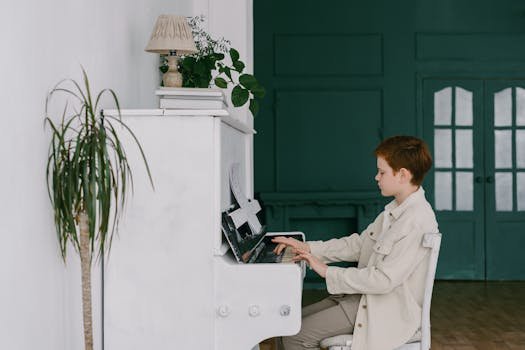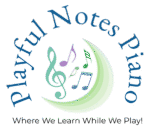When families begin piano lessons with me at Playful Notes Piano Studio here in Huntsville, AL, one of the biggest questions I get is: “How do we build a piano practice habit?” The answer? Build the habit first—worry about productivity later.
In the early weeks of lessons, we’re laying the groundwork for long-term musical growth. Even if your child’s practice time isn’t especially focused or productive yet, that’s completely okay. What matters most in the beginning is simply building a piano practice habit that fits into your family’s rhythm. Once the habit is there, everything else becomes easier.
🎯 Piano Practice Habits First, Piano Skills Later
It’s tempting to jump straight into technique, note reading, or fancy practice strategies—but without a piano practice habit, none of those tools will really stick. That’s why, during the first few months, our main goal should be consistency over perfection.
We want piano time to feel like a normal part of the day—just like brushing teeth, packing lunch, or putting on shoes. When practice becomes predictable and expected, your child will start to approach it with more focus and less resistance. From there, their skills and confidence will begin to grow naturally.

🕒 Tie Practice to Something That Already Happens
One of the easiest and most effective ways to build a piano practice habit is to tie it to something that already happens reliably each day. Think of it like stacking habits—you’re adding piano onto something you’re already doing without much thought. James Clear, author of Atomic Habits, explains this simple idea here.
Here are a few simple examples:
- After the after-school snack, head to the piano.
- After brushing teeth before bed, play a song or two.
- After breakfast, if your child is an early riser.
The best routines are the ones that don’t compete with your child’s favorite activities. Avoid tying practice to a time when they usually play video games or watch cartoons—this can create resentment or negative feelings toward the piano. Instead, choose a calm, open time that allows space for learning.
⏰ Use an Alarm for Consistency
For families with a consistent daily schedule, using a simple alarm can be a game-changer. Set a reminder for the same time each day and when the alarm goes off—it’s piano time! This approach helps take the pressure off parents to remember or enforce practice.
Keep in mind that your child’s schedule might change with sports, school projects, or extracurriculars. That’s okay! Flexibility is part of the process. You may need to re-anchor your piano practice habit to a new daily event as your routine evolves.
🎉 Don’t Be Afraid to Use Rewards
Let’s be honest—getting started is the hardest part. Especially for younger students, a little motivation can go a long way. Use stickers, checklists, or small rewards to celebrate the act of showing up to practice—even if it’s only for 5–10 minutes a day at first.
The goal at this stage isn’t perfect technique or polished pieces. It’s building a piano practice habit that feels doable and positive. If your child walks to the piano without a fuss, that’s a win worth celebrating!
🧸 Keep Expectations Age-Appropriate
For our littlest learners, it’s totally normal if early practice looks like “just playing around” on the keys or trying a song a few times without structure. That’s part of the process! In fact, studies show that short, regular music practice can help kids build emotional and cognitive skills, even when it’s unstructured in the beginning. Here’s what the NIH says about the benefits of music lessons. Over time, you’ll notice your child becoming more focused and intentional, especially if they feel supported and successful along the way.
Think of building a piano practice habit like planting a seed. With consistency and care, it will grow into something beautiful—even if you can’t see big results right away.
📝 Final Thoughts
Building a piano practice habit early on sets the stage for long-term success. Once practice becomes part of the daily routine, everything else—skills, confidence, focus—follows much more naturally. If you’re looking for more support in creating a piano routine at home, this Piano Parent Podcast episode has great insights on managing practice expectations and encouraging motivation.
At Playful Notes Piano Studio, I’m here to help families find practice routines that work for your unique schedule and lifestyle. Whether it’s anchoring practice to a daily routine, setting gentle reminders, or celebrating small wins, I believe that creating a consistent habit is the most important first step.
Looking for more tips like this? Stick around here on the Playful Notes Blog, your go-to source for all things piano lessons in Huntsville. 🎶
And if you’re looking for piano lessons in Huntsville, have a look through the Playful Notes Piano website to learn more about my approach to teaching and more about the benefits of a piano education. Ready to jump in? Click here to sign up!

